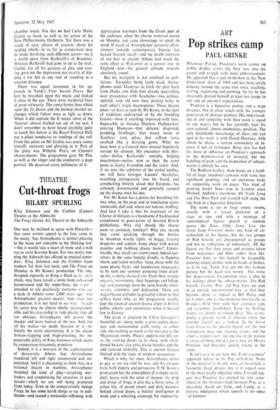THEATRE
Cut-throat frogs
HILARY SPURLING
The Frogs (Greek Art Theatre at the Aldwych) One may be inclined to agree with Plutarch— that some writers appeal to the few, some to the many, !but Aristophanes is neither pleasing to the many nor tolerable to the thinking few' —but it would take a heart of stone and a wall eye to resist Karolos Koun. For two weeks run- ning the Aldwych has offered us musical come- dies: King Solomon and the Cobbler from modern Tel Aviv last week, and The Frogs on Monday in Mr Koun's production. The one, designed expressly to bring a blush to no on:'s cheek, may have raised a smile from exhausted businessmen and the under-fives; the o,acr - intended to rife practically everyone st•hu ,;ut a dash in Athens some 2,400 years ago was Aristophanes' greatest success. And. from this production, it is not hard to see why. though his satire may be almost wholly incomprehen- sible and his cousinship to rude phallic rites all too obvious, Aristophanes still proves the sharper and more human of the two. And, for all his malice—no doubt because of it--in- finitely the more entertaining. It is the chaste bottom-slapping and thigh-pinching, the im- penetrable jollity of King Solomon which seems by comparison tiresomely primitive.
Indeed, it is a measure of the sophistication of democratic Athens that Aristophanes slandered left and right uncensored and un- punished. And it is chastening to think that, in a national theatre in wartime, Aristophanes Mounted the kind of play—attacking war- leaders and condemning the atrocities of poli- ticians—which we are still being protected from today. Even in the comparatively benign Frogs, he has some harsh things to say to poli- ticians—and caused a noticeable stiffening, with appreciative murmurs from the Greek part of the audience, when the chorus removed masks on Monday and came downstage to speak its mind. If much of Aristophanes' personal-offen- siveness towards contemporary bigwigs has passed beyond recall—and no doubt mention of red hair in ancient Athens had much the same effect as Wincarnis or a gannex mac in England now—his general attitude remains absolutely sound.
But his malignity is not confined to poli- ticians: Euripides being lately dead, Aristo- phanes sends Dionysus to fetch the poet back from Hades and finds him already quarrelling over precedence with Aeschylus—two jealous, spiteful, vain old men busy picking holes in each other's tragic masterpieces. These theatre jokes—at least as seen by Mr Koun, in the light of traditions undreamed of by the founding Greeks—have if anything improved with time. Impossible to mistake Dimitris Hadjmarkos' mincing Dionysus—that delicate, disgusted, prodding forefinger, that weary moue at Xanthias' tatty jokes, that saffron tunic swathed like a dressing gown. What we have here is a Coward hero strayed hopelessly outside his element. His encounter with Her- cules—Stelios Kafkaridis' amiable, bulging muscleman—makes, now as then, the same point as Garry Essendine and the sailor. And, if we miss the subtleties of the verbal knifing, we still have Giorgos Lazanis' Aeschylus, mouthing outrageously into his beard, and complaining bitterly aloud that Euripides has softened, domesticated and generally camped up the drama since his day.
For Mr Koun has a genius for breathing life into what on the page and in translation seems intolerably dull and, where not tedious, baffling. And here I take it that his treatment of the Chorus of Initiates is a handsome if backhanded compliment to generations of devoted British philhellenes. Why else should the chorus seem so curiously familiar? Why else should they come pricking through the bushes in shrunken woolly tights, in baggy, fraying draperies and sandals, hung about with woven pouches and bobbing plastic horns? Unmis- takably they recall our countrymen, indeed our- selves, in the same bunchy dirndls, in flapping shorts and faded woollies, hung about with the same plastic flasks and handwoven knapsacks, to be seen any summer pottering from dried- up dig to dusty classical site. Even their strange ungainly movements, their hoppings and lollop- ings and prancings, have the same beatific other- wordiy solemnity and dedication. These are Angio-Saxon attitudes in graceful tribute to that selfless band who, as the programme recalls, kept the torch of ancient drama alight in British public schools and universities when it burned low in Greece.
The point is clinched by Chloe Georgaki's beautiful set—dusty reeds, a grim gaping door- way and monumental walls rising on either side, like nothing so much as the entrance to the Mycenaean tombs. Pluto's underworld fills up, as the evening draws to its close, with aban- doned baskets. clay pots, picnic bundles and the odd tattered uitibrella. This is ancient Greece littered with the signs of modern occupation.
Which is why, for once, Aristophanes seems as gay as we are told he was, and his antique form both shapely and persuasive. If Mr Koun's production has the atmosphere of a sleepy rustic idyll, heavy with the scent of incense, the plop and drone of frogs, it also has a fierce sense of urban life, of paved streets and dirty business behind closed doors, a baleful intelligence at work and a whistling contempt for mediocrity.






























 Previous page
Previous page